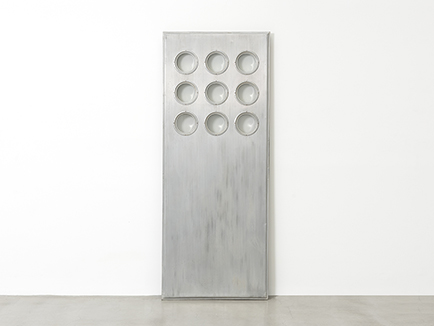
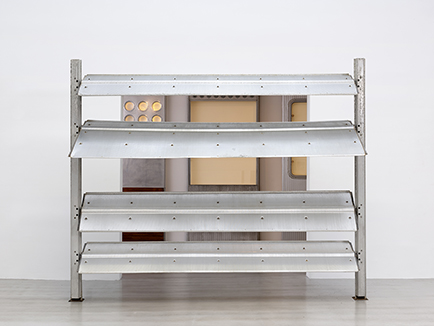
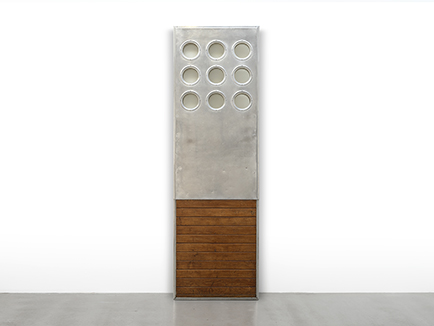
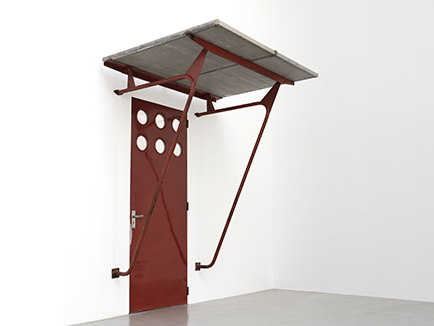
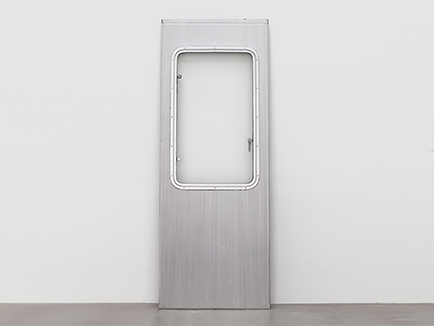
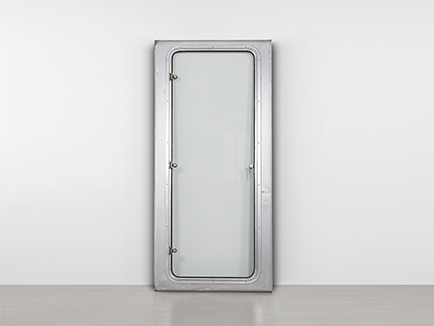
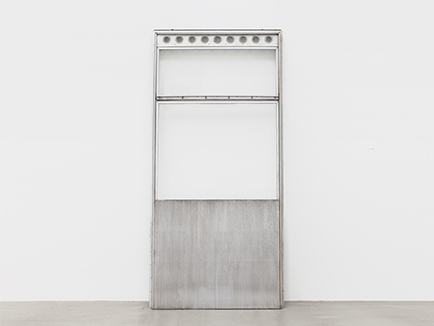
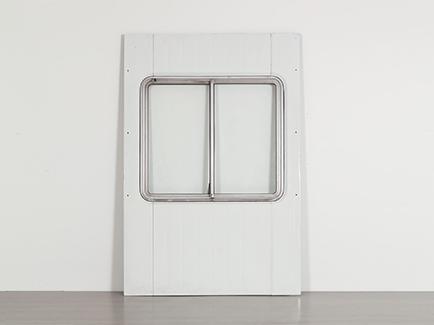

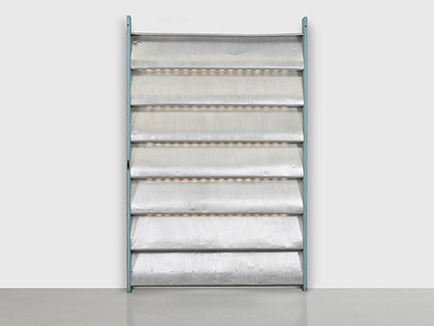
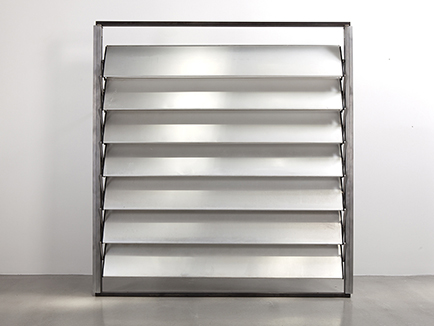
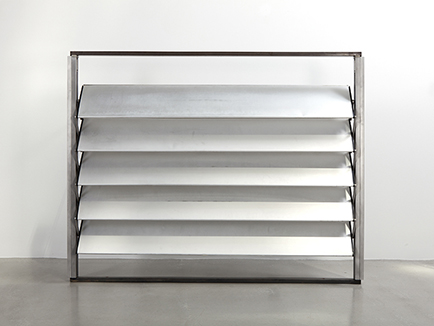
JEAN PROUVE
1901 Jean Prouvé was born in Paris on April 8th into a family of artists: Victor Prouvé, his father, is a painter and Marie Duhamel, his mother, a pianist. He is the second of seven children. In Nancy in 1904, Victor Prouvé succeeds Emile Gallé as president of the “ École de Nancy ” Art Nouveau movement, and later becomes director of the École des beaux-arts.
1916-21 The learning years
1916-19 Learns wrought iron skills in the Enghien workshop of sculptor-ironworker Emile Robert, a friend of his father. In 1917 he begins making his own wrought iron pieces: a garden gate for the painter Victor Guillaume and a base for a vase made by his godfather Emile Gallé.
1919-21 Trains under the wrought-iron craftsman Szabo in Paris, learning modern metalworking and welding techniques.
1921-23 Military service in the cavalry. Shows his wrought-iron work in exhibitions at the École des beaux-arts in Nancy.
1924-31 First workshop, Rue du Général Custine, Nancy : “ Jean Prouvé, wrought iron craftsman ”
1924 Marries Madeleine Schott, one of his father’s students at the fine arts school. They will have five children. Numerous projects in Lorraine: gates, railings, chandeliers, etc.
1925 Exposition internationale des Arts décoratifs, Paris (International Exhibition of Decorative Arts). Crucial contact with modernism, sparking his interest in sheet metal, stainless steel and advances in welding techniques.
1926 Member of the Comité Nancy-Paris, an avant-garde group founded by Georges Sadoul. Glass roof, banisters, balusters, furniture and light fittings for the Palais de la Bière, Nancy.
1927 Gate for the Reifenberg House in Paris (Robert Mallet-Stevens, architect).
1928 First bent sheet metal elevator cars. His light fittings are produced and marketed by the DIM Gallery.
1929 Founding member of the Union des artistes modernes (UAM). First furniture: adjustable reclining armchair, pedestal table with rubber top, folding reclining chairs. First patents taken out in the name Jean Prouvé: movable partitions, metal doors, sash windows. Numerous metal items for the building industry: banisters, sash windows, movable indoor partitions, bent sheet metal elevator shafts, notably for the Hôtel de l’Hermitage in Vittel (designed by F. César), for which he also creates furniture. Glass facade for the Marbeuf garage in Paris, (A. Laprade and L. Bazin, architects).
1930 Takes part in the first UAM exhibition, notably showing his furniture. Numerous items for the Grange-Blanche hospital in Lyon (T. Garnier, architect). Furniture design competition for the Cité universitaire in Nancy (bed, bookshelves, desk, chair, armchair).
1931 Founding of the company “Ateliers Jean Prouvé” and the move to new premises on the Rue des Jardiniers in Nancy. This space facilitates modernization of working techniques and fulfi llment of Jean Prouvé’s new goals: increasingly industrialized items for the building industry and mass-produced furniture. From here on the many patents taken out by Jean Prouvé are systematically in the name of “Ateliers Jean Prouvé”, the name that becomes his signature. Furniture for the public sector (the Cité universitaire in Nancy, hospitals, sanatoriums, offi ces). Railings and stainless steel doors for the liner Koutoubia. Main gate for the Musée des Colonies in Paris (A. Laprade, architect).
Large glass facade for the Citroën showrooms in Lyon (M. Ravazé, architect).
1932 Doors and windows for the Musée et institut de zoologie in Nancy (J. and M. André, architects). Facades and stainless steel vitrines for the Gillet- Lafont store in Nancy (P. Le Bourgeois, architect). Metal joinery at the Cité de la Muette, Drancy, 1932- 39, (E. Beaudouin and M. Lods, architects). 1933 Designs a bus station for Citroën at Paris La Villette. Doors, partitions, furniture, joinery for the Boulogne- Billancourt city hall, 1933-35 (T. Garnier, architect).
1933 Designs a bus station for Citroën at Paris La Villette. Doors, partitions, furniture, joinery for the Boulogne-Billancourt city hall, 1933-35 (T. Garnier, architect).
1934 First “standard” type chair with a tubing and bent steel base. Lecture-hall furniture for the École des sciences politiques, Paris. Stainless steel panels and offi ce furniture for the Compagnie parisienne de distribution d’elec-tricité, Paris, 1934-35 (U. Cassan, architect).
1935 Roland-Garros Aviation Center, Buc, 1935-36 (E. Beaudouin and M. Lods, architects). Ocean liner cabin fitted out with stainless steel for the OTUA exhibition, in association with interior decorator Marcel Gascoin. Numerous public sector furniture projects: desks, armchairs, bookshelves, beds, tables, chairs, scholastic furniture.
1936 Purchase of the Pels metal pressing and folding machine (length of bend: 4 meters). The Maison du peuple and covered market in Clichy, 1935-39 (E. Beaudouin and M. Lods, architects, V. Bodiansky, engineer). Bronze joinery for the French embassy in Ottawa, 1936-38 (E. Beaudouin, architect). Entrance doors for the Ministère des PTT (Ministry of the Post and Telecommunications) in Paris, 1936- 39 (J. Debat-Ponstan, architect).
1937 Bathroom unit for a project by Le Corbusier, Pierre Jeanneret and Charlotte Perriand. Staircase for the UAM pavilion and steel and Rhodoïd garden furniture, with Jacques André, Exposition Internationale, Paris. “BLPS” weekend house, (E. Beaudouin and E. Lods, architects, Ateliers Jean Prouvé and Forges de Strasbourg, constructors), prototype 1937-38. Ministère de l’Air competition: internal portal frame principle; external portal frame principle,1937-38.
1939 Competition for the construction components for OTUA (M. Lods, architect). Demountable buildings with internal portal frame and furniture for the SCAL, Issoire, with the BCC (Central Construction Bureau), (P. Jeanneret, architect). Production of several hundred demountable, external frame barracks for combat units of the IVth and Vth armies. Prototype for a caravan, with P. Jeanneret. 1940-44 The War years; Jean Prouvé plays an active part in the Resistance. Wartime production: gas generators for trucks, charcoal ovens, “Pyrobal” stoves, bicycle frames, trailers, etc. “Écoles volantes” project (temporary school buildings) and village clubhouses with internal portal, with Le Corbusier and Pierre Jeanneret. 8×8 pavilon with wooden portal frame for the BCC, Saint-Auban, 1941-1942 (P. Jeanneret, architect). “All wood” furniture: chairs, tables, stools. Furniture for the Solvay hospital in Dombasle: chaise longue and designs for the Visiteur armchair. Offi ce furniture: tables, chairs, rack shelving. Designs aluminum house with Marcel Lods and builds prototype.
Restores the Jean Lamour gates on Place Stanislas and Place de la Carrière in Nancy.
1944 Nancy is liberated. Pending elections, Jean Prouvé is made mayor (September 1944-May 1945) and a member of the Assemblée consultative provisoire. Actively dedicates himself to restoring acceptable living conditions and promoting public awareness of the need for mutual aid.
1945 450 demountable houses 6 x 6 m and 6 x 9 m with internal portal frame for refugees in Lorraine.
1946 After five years in POW camps, his brothers Henri and Pierre return to the Ateliers Jean Prouvé. Portal frame building site huts for the mines at Zellidja, in Algeria. Founds the Stahlhaus company in conjunction with the Dillingen steelworks. Prototype house build at Sarrebruck. Prefabricated house for an experimental Ministère de la Reconstruction project at Noisy-le-Sec (with H. Prouvé). Studies prefabricated units for Le Corbusier’s Unité d’Habitation in Marseille (Le Corbusier, architect). Domestic furniture; “all wood” dining room suite (sideboard, table, chairs); awarded the 1947 Meubles de France seal.
1947 The Ateliers Jean Prouvé leave the Rue des Jardiniers and move into a real factory in Maxéville, near Nancy. Gold Medal from the Ministère de la Reconstruction et de l’Urbanisme (MRU). Designs the École professionnelle de Verrerie, Croismare, 1947-48 (H. Prouvé, architect). Portal frame cabins for the EDF mobile site at Ottmarsheim, 1947-48. Testing chambers and partitions for the Institut de recherche de la sidérurgie (IRSID) at Saint-Germainen- Laye, 1947-52 (R. Coulon, architect).
1948 Offices for the Ferembal factory, Nancy (H. Prouvé, architect). Designs the “Haricot” desk, later renamed “Présidence”.
1949 Aluminium Français buys into the Ateliers Jean Prouvé. Aluminium Français subsidiary STUDAL given exclusive sales rights in the construction sector. Steph Simon becomes exclusive agent for “Ateliers Jean Prouvé” furnishings. Partitions and furniture for the Organisation européenne de coopération économique (OECE) in Paris (J. Démaret, architect). Facade panels for the Fédération nationale du bâtiment in Paris, 1949-51 (R. Gravereaux and R. Lopez, architects). Metal fl oors, staircases and furniture for the display apartment in Le Corbusier’s Unité d’Habitation in Marseille, 1949-50 (Le Corbusier, architect). Primary schools and teachers’ accommodations, Vantoux and Bouqueval (H. Prouvé, architect). Competition for the state offi ces, law courts and secondary school, Niamey, Nigeria (P. Herbé,
architect). Tropique House, Niamey, Nigeria (H. Prouvé, architect). Portal frame and “Coque” houses, MRU housing development in Meudon, 1949-53, (H. Prouvé and A. Sive, architects). Portal frame holiday house for the Dollander family, Le Lavandou / Saint-Clair, 1949-51 (H. Prouvé, architect).
1950 Made Chevalier de la Légion d’honneur for his work in the Resistance. Hangar structure roof for the Mame printers in Tours, 1950-52 (Drieu la Rochelle and B. Zehrfuss, architects). Métropole house (H. Prouvé, architect) for the Salon des arts ménagers, Paris. Facades for the palais de la Foire, Lille, 1950-51 (P. Herbé, architect). Le Placieux kindergarten, Villers-les-Nancy (H. Prouvé, architect). Martigues kindergarten, 1950-53 (A. Arati, M. Boyer and C. Lestrade, architects). “Coque” houses for Citroën (Nardin and Oudot, architecture interns).
1951 Founding member of the groupe Espace. “Coque” house for the Salon des arts ménagers, Paris (H. Prouvé, architect). Lopez House, Guerrevielle, 1951-54 (H. Prouvé, architect). Salle méridienne (central hall), Paris Observatory (A. Rémondet, architect). MM. Janicot Houses, Charenton (H. Prouvé, architect). Facade panels for the Casino de la Grande Côte, Royan (L. Simon architect).Tropique Houses for Aluminium français, Brazzaville. Filling stations for Mobiloil, Shell and Socony. IXth Milan Triennial: prize for a metal-frame table. Bergères Lecture-hall seats, Aix-Marseille University,
1951 Furniture and fittings for the Air-France Congo building in Brazzaville (Ch. Perriand, interior decorator). Centrale table. Lighting library table for the Maison de l’étudiant in Paris, with Charlotte Perriand and André Salomon.
1952 Grand Prix of the Cercle d’études architecturales for the facades and partitions of the Fédération nationale du bâtiment building, with architects Raymond Gravereaux and Raymond Lopez. Industrial-production classroom and scholastic furniture, Salon des arts ménagers, Paris. Facades and sun-shutters for the Hôtel de France, Conakry (Atelier LWD, architect). Aviation center at Doncourt-les-Confl ans, 1952 57 (J. and B. Ogé and Le Corbusier, architects). Firestation, Bordeaux, 1952-53 (Cl. Ferret, architect). Aluminum facades for the Front de mer, Royan. Study for aluminum “voile grille” facades.Designs for the Alba House, 1952-53 (M. Silvy, architecture intern). Projects for the central-core tower at the Université européenne in Nancy (J. Belmont, M. Silvy and T. Carim, architecture interns). Facades for the Nièvre prefecture, Nevers, 1952-53 (Robert, architect). Offi cial contract with Charlotte Perriand and Ateliers Jean Prouvé employee Martha Villiger for furniture design—notably for the bookshelves—in the Maison de la Tunisie and Maison du Mexique student dormitories at the Cité universitaire in Paris, and offi ces in Africa. Aluminium Français becomes the majority stakeholder in the Ateliers Jean Prouvé.
1953 “Compass” base desks and tables. Presents a school unit and scholastic furniture at the Zürich Exhibition. Gate for the ClAM (International Congress of Modern Architecture) in Aix-en-Provence, with architecture interns J. Belmont and M. Silvy. Facade panels, porch roof and furniture for the Sécurité sociale offices in Le Mans, 1953-54 (J. Le Couteur, architect). Facades for the apartment block on Square Mozart, Paris, 1953-54, (L. Mirabeau, architect). Schools at Palaiseau, L’Hay-Ies-Roses, Saint-Avold, Saint-Michel-Chef-Chef, Aubergenville etc., 1952- 53. Facades and interiors for the SFR plant in Saint- Egrève (A. Gutton, architect). Wins the competition for the project for the Cité universitaire in Nancy, with P. La Mache (architect), T. Carim and M. Silvy (architecture interns) and S. Kétoff (engineer). Facades for the state offi ces in Bayonne (A. Remondet, architect). Design for a polar research station in Terre Adélie (V. Bodiansky, engineer). Numerous items of furniture for the public sector, (in particular student dormitories). In June, Jean Prouvé designs the bent aluminum “Tokyo” table in collaboration with Charlotte Perriand. Resigns as CEO of Ateliers Jean Prouvé as a sign of his disagreement with Studal policy. He stays on as administrator at Ateliers Jean Prouvé until January 1956.
1954 Works in the Aluminium Français offi ces in Paris, but remains in contact with the factory at Maxéville. Pavilion for the Centenaire de l’aluminium, Paris (M. Hugonet, engineer). Schools at Blanc-Mesnil (A. Lurçat, architect), Custines (Ph. Legrand, architect), Genneville, etc. Builds his own house in Nancy. Aluminum facades for social housing blocks, Saint- Jean-de-Maurienne (M. Blanc, architect). Sun-shutters for a holiday spot at Cap-Martin, (Le Corbusier, architetct).
1955 “Beauté France” seal of approval for the architectural features of the Centenaire de l’aluminium pavilion. Props and facades for the Institut français des pétroles, Rueil-Malmaison (P. Dufau, architect). Design for a mass-produced apartment block. Furniture, Cité universitaire,
Antony.
1956 On March 15th, the Ateliers Jean Prouvé company in Maxéville becomes the Ateliers de construction préfabriquée de Maxéville (ACPM).
In Paris, Jean Prouvé sets up the company “Les Constructions Jean Prouvé,” with Michel Bataille. On April 1st, Steph Simon (who has opened a gallery on the Boulevard Saint Germain), exclusive distributor of Ateliers Jean Prouvé furniture, becomes the manufacturer of Charlotte Perriand and Jean Prouvé furniture. Designs and creates the glass roofs at CNIT (Centre des Nouvelles Industries et Technologies),
Paris-la-Défense (B. Zehrfuss, R. Camelot and J. de Mailly, architects). Maison des Jours Meilleurs for Abbé Pierre. Cachat pump room, Evian, 1956–57 (M. Novarina, architect, S. Kétoff, engineer).
1957 Constructions Jean Prouvé is absorbed by the Compagnie industrielle de matériel de transport (CIMT). Jean Prouvé is put in charge of the construction department while retaining the freedom to work and an engineering consultant. The consultancy is henceforth known as CIMT-Jean Prouvé. Temporary school at Villejuif. Lobby for the Renault building in Flins (B. Zehrfuss, architect). Studies for “ nomadic ” churches and executes projects in Moselle, 1957-63.
1958 Holds the chair of Conservatoire national des arts et métiers (CNAM) in Paris, 1958-71. Sahara House at the Salon des arts ménagers, Paris (Ch. Perriand, cabin fi ttings). Facade panels for the social housing block La Tour du Fer à Cheval in Roubaix, (G. Gillet, architect). Bagnols-sur-Cèze secondary school (Badani and Roux-Dorlut, architects). Pavillon de la France (G. Gillet, architect, R. Sarger,
engineer) and pavillion du Luxembourg (R. Mailliet, architect), Exposition universelle, Bruxelles.
1959 Glass facade and superstructure for the shopping mall at Orly Sud airport (H. Vicariot, architect). Administrative buildings and underground facilities for the EDF company at Serre-Ponçon (J. de Mailly, architect). M. Bosquet House, Cordon, France.
1960 Vice-president of the Cercle d’études architecturales. Light diffuser, curtain wall and doors for the Musée et maison de la culture in Le Havre, 1955-61 (Audigier and Lagneau, Weill, Dimitriejevic, architects). Facade for the Institut national des sciences appliquées, Lyon (Perrin-Fayolle, architect). Facade panels for the mass-produced GEEP schools (M. Silvy, J. Belmont, architects). Schools in Cameroon (Atelier LWD, architect).
1961 Buildings for the faculté des Sciences in Lyon (Perrin-Fayolle, architect). Parish centre and design for a church, Villerupt- Cantebonne. Seynave House, Beauvallon, 1961-62 (N. Hutchison, architect, J. Parente, Sauzet and Vilfour, supervising architects). Sheathing for the isotope separation factory at Pierrelatte (J. Swetchine, engineer).
1962 Gauthier House, Saint-Dié (H. Baumann, associate). Reynolds Prize for the Centenaire de l’aluminium pavilion, the Evian pump room and the Le Havre museum.
1963 Auguste Perret Prize awarded by the UIA (International Union of Architects). Facade for CIMT headquarters in Neuilly (Deschler, architect). Church at L’Hay-Les-Roses (P. Picot, architect). Enters the competition Conception-Construction, Ministère de l’Éducation nationale design and building (with J. Belmont, J.-C. Périllier and M. Silvy). Formulates his “tabouret” (stool) building principle, a weight bearing system with a single central pilotis.
1964 Jean Prouvé exhibition in the Marsan Pavilion, Musée des Arts décoratifs, Paris. Exhibition pavilions, parc des Floralies, Orléans-la- Source.
Facade of the French embassy in Warsaw, Poland (H. Bernard, G. Gillet, B. Zehrfuss, arch.), molded aluminum panels.
1965 Chevalier de l’ordre des Arts et des Lettres. Youth centre prototype for the Salon des artistes décorateurs, Grand Palais, Paris (Perrotet and Deroche, architects). Studies polyester-panel houses for Saint-Gobain, 1965-69. Public university, Berlin, 1965-73 (G. Candilis, A. Josic, S. Woods and M. Schiedhelm, architects).
1966 End of Jean Prouvé’s activity at CIMT. “Tabouret”-system school, lobby and two houses at the Villagexpo, Saint-Michel-sur-Orge. Facades for Grenoble city hall (M. Novarina, architect).
1967 Jean Prouvé opens his own consultancy on Rue des Blancs Manteaux, Paris. Facades for girls’ secondary school, Orléans-la- Source, 1967-68 (M. Andrault and P. Parat, architects). Youth club, Ermont. Nobel Tower, La Défense, Puteaux (J. de Mailly and H. Depussé, architects). 1968 Palais des expositions, Grenoble (Cl. Prouvé, architect). Facades for the oceanography centre in Nantes (O. Vaudou and R. Luthi, architects). Facades for the medical faculty in Rotterdam, 1965-68 (OD 205: Choisy, van Emdben, Roorda van Eysinga, Smelt, Wittermans and Hagoort, architects). Competition for the French pavilion at the Universal Exhibition in Osaka.
1969 Facades and structure for the Institut de l’environnement, Paris (R. Joly, architect). Facades for Unesco Building V, Paris (B. Zehrfuss, architect). Administrative center for the new town of Le Vaudreuil. Petroff-system freeway fi lling stations for Total.
1970 Circular buildings for Total fi lling stations. Facades for the Sandoz laboratories, Rueil- Malmaison (B. Zehrfuss, architect). Architecture School, Nancy (J. Binoux and M. Foliasson, architects). Jaoul House, Mainguerin (J.-C. Drouin, architect). Facades for the headquarters of the PCF (French Communist Party), Paris (O. Niemeyer, architect). Study for Les Arcs 2000 ski resort, with Charlotte Perriand. 1st Prize for the competition for the offi ces of the Ministère de l’Éducation nationale (with J. Belmont and J. Swetchine).
1971 End of Jean Prouvé’s teaching career at CNAM. President of the Cercle d’études architecturales, 1971-77. President of the jury for the Centre Georges Pompidou competition, Paris. Les Evettes mountain shelter (G. Rey-Millet, architect).
1972 Made an associate member of the Académie Stanislas in Nancy. Medal for Research and Technique awarded by the Oscar Phidias Academy of Architecture. Bron-Parilly University, Lyon (R. Dottelonde, architect, Pétroff, engineer). Facades for the Crédit Agricole bank headquarters, Bourg-en-Bresse (P. and M. Dosse, architects).
1973 School, Trappes (Merlin, architect).
1974 Perrache Trainstation, Lyon (R. Gagès, architect).
1975 Prize in the La Villette competition (with J. Belmont). Studies and builds the bell-tower for the Notre- Dame-du-Haut chapel at Ronchamp, after an idea by Le Corbusier.
1976 Designs “umbrella” structures for the Forum des Halles in Paris 1976-80 (J. Willerval, architect). Designs the structure for the Bercy velodrome, Paris (M. Andrault and P. Parat, architect). Aviary at Villars-les-Dombes (P. Dosse, architect).
1981 Medal of Commandeur de la Légion d’honneur presented by President Mitterrand at the Palais de l’Élysée. Erasmus Prize and “Jean Prouvé, Constructeur”, exhibition at the Boijmans Van Beuningen Museum, Rotterdam. TV tower, Ouessant (J.-M. Jacquin, architect).
1982 Grand prix d’architecture de la Ville de Paris.
1983 Metro terminus shelter, Paris (L. Petroff, engineer).
1984 Jean Prouvé dies at home in Nancy on March 23rd.